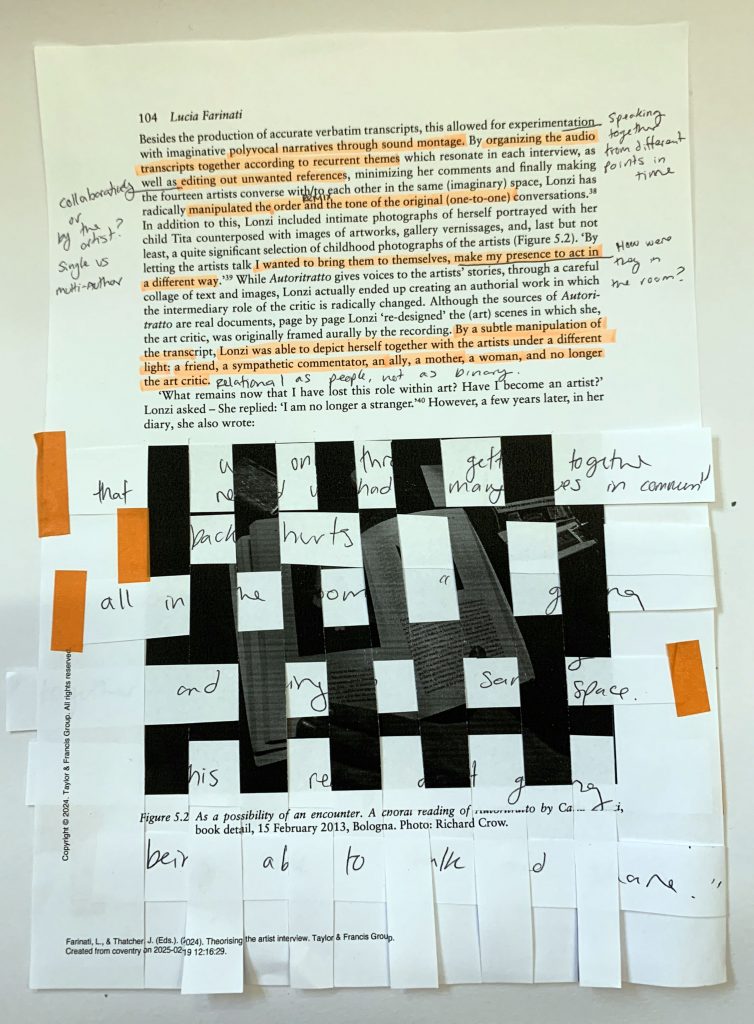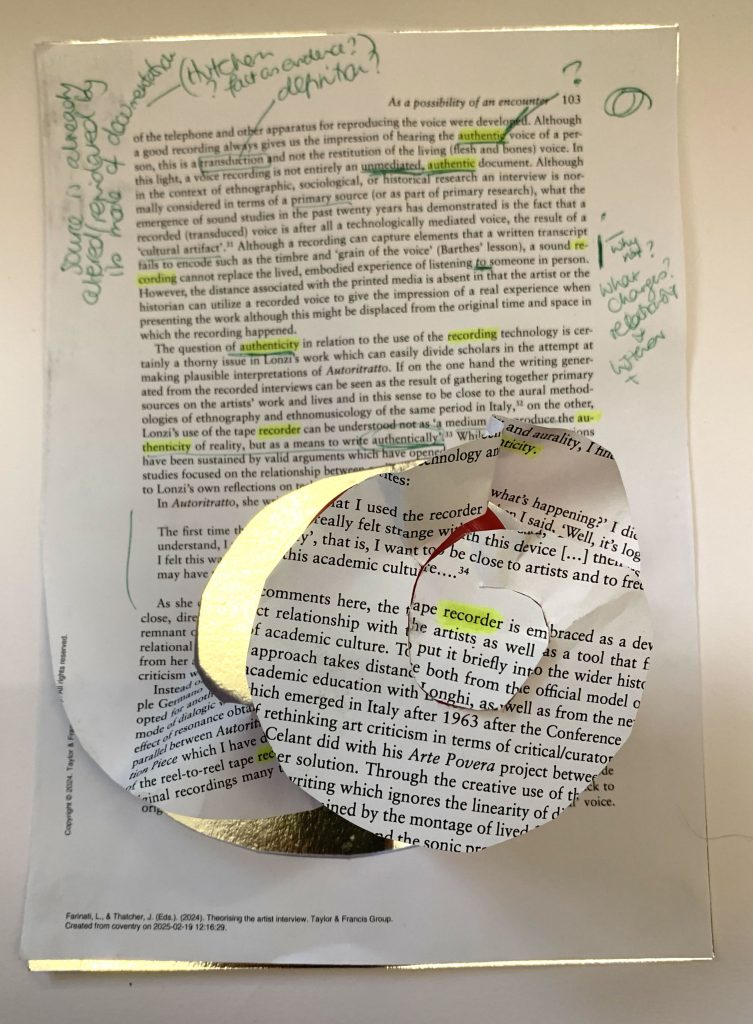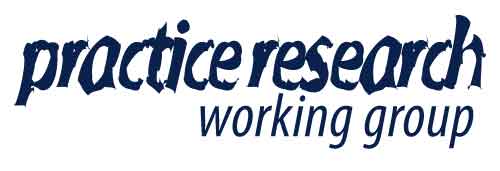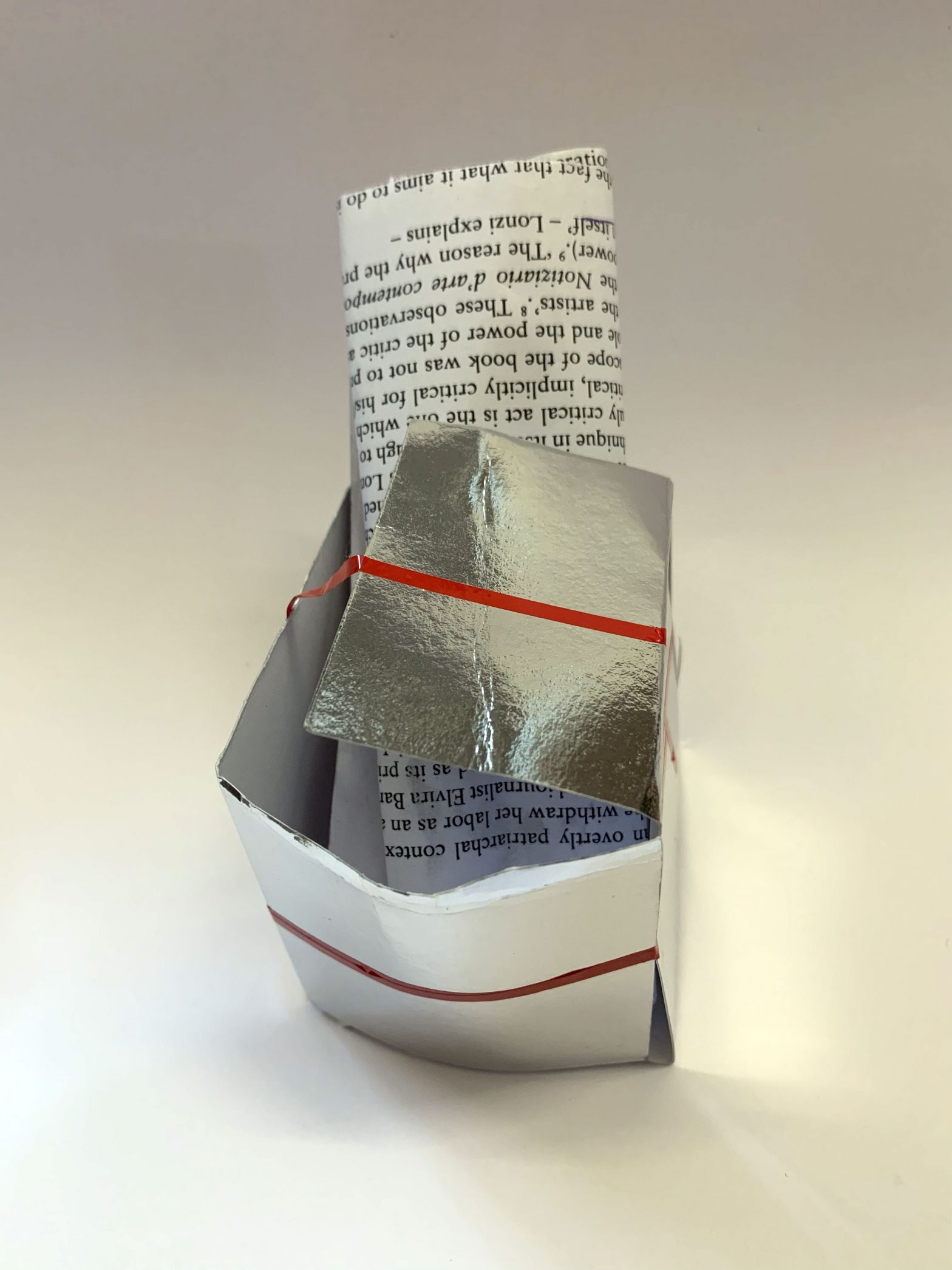The Post-Publishing & ArtSpaceCity research strands of the university’s Centre for Postdigital Cultures held a day-long event exploring the boundaries between the scholarly and the creative. Through a mixture of talks and hands-on practice, they troubled the line between research, literature and performance, investigating co-created, genre-defying, ways of writing, annotation, attribution, presentation, and publication.
The event included talks by Dr Lucia Farinati and Adeola Eze. It asked questions about authorship, how we engage with research material, how we write, and how we might write and annotate collaboratively. One of the key questions is how can working with texts, or interviews with research participants be incorporated into thesis writing in a way that goes beyond simply citing or quoting a work?

According to postgraduate researcher Alex Parry:
One of the reasons I was interested in working with colleagues on this subject is that I believe elements of collaborative practice in scholarly work is not discussed enough. I never did any training on how to write notes, annotate or cite others’ work. During my earlier studies, I found that students were expected to know how to write notes on lectures, articles and books. I learned how to work with other people’s texts and ideas by doing it. To me, annotation and working with other people’s text often felt implicit or obscured from view. As annotation was not discussed, it felt private and solitary. In a talk about his research on annotation, Remi Kalir [who Adeola discussed later] reminds us that annotations have a social life beyond the page, whether that is handwritten responses in a book that are read in a bookshop years later, collective annotations in reading groups, or other forms of comment and notation such as in graffiti.
In my artistic practice, I frequently collaborate with others. Collaboration is always a nuanced negotiation, and, like my experience learning to annotate, I have often stumbled through it. Again, the work of collaboration itself has frequently felt somewhat implicit. In my work researching participatory art workshop practices, one artist describes why this might be:
‘in theatre and live art, it is easier to find established methods for collaborative practice,which contrasts with how art practice is often depicted, taught, and enacted as solopractice.’ (Edginton, 2024)
In my experience, collaboration is often tricky. it is not an easy practice. Yet, despite its difficulties and sometimes breakdowns, the demand for negotiation in collaboration fosters a practice of learning to work and think together. It is a continual attempt to orient oneself within and towards collective practice.
Whether working with voices on or off the page, collaborative practice is always a question of power and agency—a means of speaking back, with, or to. Kalir describes the possibility of ‘courageous annotation’ that can support justice-oriented objectives (Kalir, 2020, p. 63). This involves taking risks, being present, and engaging in critique.
As an artist and academic, citation, borrowing, blurring, stealing, and being inspired are inherent in the process. Working with different voices comes in many forms, whether through annotation, quotation, interview practices, writing a paper, or hosting an event or talk like this. Everything is in relation to other beings – be it human or more than human. Within this interconnected network no work is done in isolation.
The organisers are a collective of postgraduate researchers who bring diverse knowledge and practices to the subject.
Clare Harvey – is a novelist researcher. Her practice research looks at how remix can be used as a new way to write biographical fiction. Her claim is that sampling from memoirs and incorporating ‘real’ voices into fiction elevates fictional subjects to the status of co-authors, thereby representing their lives in a more ethical way within the story.
Adeola Eze is with the Centre for Arts, Memory and Communities. Her research explores the significance of book formats from antiquity, prior to the printing press, in deepening our understanding of the relationship between historical contexts and contemporary literature. Adeola Eze is a children’s book author, young writers’ mentor, and publisher. She runs PhD Beyond 50, a blog and community space for mature PhD students, offering support, advice, and reflections on doing doctoral work beyond midlife.
Alexandros Plasatis is a doctoral student at Coventry University’s Centre for Postdigital Cultures. He is the founder, publisher and lead editor of the other side of hope: journeys in refugee and immigrant literature, a literary magazine edited by immigrants and refugees that publishes poetry and prose by migrants from around the world. Established in 2021, the other side of hope receives funding from Arts Council England, and became the UK’s first ever literary magazine of sanctuary. His first book, Made by Sea and Wood, in Darkness, narrates the lives of the undocumented Egyptian migrants who work as fishermen in a Greek town, and was shortlisted for the Edge Hill Prize. Stories from this book have been nominated for the Pushcart Prize and Best of The Net. He has a PhD in ethnography-based Creative Writing.
Alex Parry – I am an artist-researcher conducting practice-led research on the role of participatory art workshops in what is described as the current polycrisis, a global intersection of crises that exceeds the sum of their parts. I explore the participatory art workshop as a space to build association and imagination. As part of my research, I have interviewed artists about their participatory art workshop practices to gain a deeper understanding of how these workshops are often sidelined and considered a secondary art practice and their relevance in the context of wider precarity today.

The order of the day was as follows:
It started with Adeola Eze with Remixing Scholarship – Kathleen Fraser’s Poetic Reworking of the Vindolanda Writing Tablets
This session explored Kathleen Fraser’s m ov a b le TYYPE (2011), a collection that moves beyond conventional poetry into visual experimentation. While Fraser’s earlier work reflects feminist and modernist themes, here she engages with artist books, typography, and the poetic value of ‘errors,’ ‘absences,’ and ‘visual transfusions.’ Adeola focused on Fraser’s poem ‘from The Vindolanda Writing Tablets (Tabulae Vindolandenses III),’ which echoes ancient Roman tablets but is inspired by their 2003 scholarly edition by Alan Bowman and David Thomas. Fraser remixes this material, tracing a path from ancient Roman handwritten text to scholarly edition and to poetic transformation. How does remixing ancient and scholarly texts opens new creative possibilities? How can poetic experimentation reinterpret ancient narratives? How might textual transmission become a site of innovation?
Following this, Clare delivered a writing workshop which used elements from Lucia Farinati’s ‘As a Possibility of an Encounter’ as the stepping off point for a series of micro-writing activities. This was be a playful, practice-based response to some of the ideas Adeola Eze discussed around the transformation of historical records/scholarship into creative work. Using these recombinatory writing games also served as an introduction to Farinati’s work, which was explored through the afternoon’s sessions (for anyone interested in the scholarship that underpins this session, recombinatory writing games fit within the framework of Creative Writing Games for Reading, which use creativity as a motivator for reading scholarly texts; a useful reference point would be Allen Jones’ paper “Open World” Texts: A Framework for Analyzing Recombinatory Writing Games (RWGs))
After lunch, Adeola, Clare and Alex joined forces. This hands-on session focused on their annotation practice – how we annotate and why, as well as how annotation can alter the meaning of a text itself. Whilst focusing on Farinati’s work, they considered how annotation as a practice can not just reinforce authorial meanings, but create new meanings, too.
For the final session of the day, they were fortunate to have Lucia to discuss her text ‘As a Possibility of an Encounter: A Performative Reading of Autoritratto (Self-Portrait) by Carla Lonzi’ (2024). Carla Lonzi’s work, Autoritratto (Self-Portrait), published in 1969, is a constructed text described by Lucia as an ‘imaginary convivium’ (Farinati, 2025: REF). The text brings together interviews Lonzi conducted as an art critic with male artists and one female artist over the course of seven years. Lucia’s article not only examines Carla Lonzi’s innovative approach to interview practices but highlights its significance as an important feminist work and as a creative tool for prefigurative feminist micropolitics. The article thoughtfully reflects on concepts of authenticity and emphasises the roles of recording, listening, transcribing, assembling, and re-performing interviews. This article is part of Theorizing the Artist Interview, a collection edited by Lucia and Jennifer Thatcher, which brings together various approaches to the artist interview.
References
Kiesewetter, Kolb (REF) Annotating Publishing : Publishing as instituent practice
Kalir, J. (2020) “Annotation is first draft thinking”: Educators’ Marginal Notes as Brave Writing. English Journal 110.2 (2020): 62–68
Kalir, J. (2025) Re/Marks on Power How Annotation Inscribes History, Literacy, and Justice. MIT Press.
Lucia Farinati is a writer-researcher, curator and activist. In 2007 she established Sound Threshold, an interdisciplinary curatorial project that explores the relationships between site, sound and text. She has worked with the Precarious Workers Brigade and the Micropolitics Research Group and has collaborated with many sonic art projects and radio initiatives. Her research focuses on dialogic aesthetics, especially on the work of artist William Furlong and the feminist writing of Carla Lonzi which she has activated through collective readings and radio broadcasts. She holds a PhD in Critical Studies from Kingston University, London. She is the co-author of The Force of Listening (2017), Training for Exploitation? Politicising Employability and Reclaiming Education(2017) and co-editor of Theorising the Artist Interview (2025)

